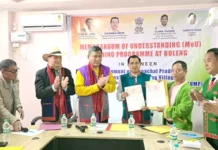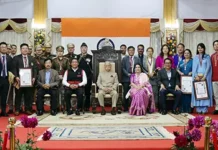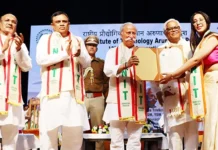NEW DELHI, Aug 5: The government on Monday revoked Article 370 which gave special status to Jammu & Kashmir and proposed that the state be bifurcated into two union territories (UT), Jammu & Kashmir, and Ladakh, provoking outrage from the NC and the PDP and triumph from leaders of India’s ruling BJP.
Meeting a long-held promise of the BJP, union Home Minister Amit Shah moved a resolution in the Rajya Sabha that Article 370, which allowed Jammu & Kashmir to have its own constitution, will no longer be applicable.
“The president on the recommendation of Parliament is pleased to declare as from 5th of August, 2019, all clauses of the said Article 370 shall cease to be operative…,” stated the resolution moved by the home minister.
Shah also moved a bill proposing bifurcation of the state of Jammu & Kashmir into two union territories – Jammu & Kashmir division, and Ladakh.
Shah, who introduced the Jammu & Kashmir reorganisation bill, said the union territory in Ladakh will have no legislature like Chandigarh. The other union territory of Jammu & Kashmir will have a legislature like Delhi and Puducherry.
The announcement, capping days of uncertainty in Jammu & Kashmir, led to an uproar in the house and outside it too.
India had failed Kashmir in keeping its promises, PDP chief and former J&K chief minister Mehbooba Mufti said.
She said the government’s unilateral decision “to scrap Article 370” is illegal and unconstitutional.
It will make India an occupational force in Jammu & Kashmir, Mufti said on Twitter.
“It will have catastrophic consequences for the subcontinent. GoI’s intentions are clear. They want the territory of J&K by terrorizing its people. India has failed Kashmir in keeping its promises,” Mufti, who is under house arrest in Srinagar, said on Twitter.
“Not sure how long I’ll be able to communicate. Is this the India we acceded to?” she asked.
National Conference leader Omar Abdullah echoed her outrage, also labelling the government’s move “unilateral.”
“Government of India’s unilateral and shocking decisions today are a total betrayal of the trust that the people of Jammu & Kashmir had reposed in India when the state acceded to it in 1947. The decisions will have far-reaching and dangerous consequences. This is an aggression against the people of the state as had been warned by an all-parties meeting in Srinagar yesterday,” he said.
The government, he said in a statement, had resorted to “deceit and stealth” to lay the ground for these disastrous decisions.
“Those of us who gave democratic voice to the people of Jammu & Kashmir are incarcerated as lakhs of armed security personnel have been put on the ground… A long and tough battle lies ahead. We are ready for that,” he said.
The mood was triumphant in the BJP quarters.
The government’s move on Article 370, said senior party leader Arun Jaitley, was “a monumental decision towards national integration.”
His party colleague Ram Madhav also hailed the decision.
“What a glorious day. Finally the martyrdom of thousands, starting with Dr Shyam Prasad Mukherjee, for complete integration of J&K into the Indian union is being honoured and the seven-decade-old demand of the entire nation being realized in front of our eyes; in our lifetime. Ever imagined?” he tweeted moments after Shah’s announcement.
Party spokesperson Shahnawaz Hussain said the move had opened the path of growth and development for Jammu & Kashmir.
RS approves resolution on J&K
The Rajya Sabha on Monday approved the resolution abrogating Article 370 for Jammu & Kashmir and a bill to bifurcate the state into two union territories with Home Minister Amit Shah saying the controversial provisions were responsible for poverty and lack of development in the state.
Allaying opposition fears of all hell breaking loose after the move, Shah replied that “nothing will happen” and it wouldn’t be allowed to turn into another battle-torn Kosovo.
He said full statehood would be restored to Jammu & Kashmir at an “appropriate time” and after “normalcy” returns.
The bill provides for bifurcation of the state into two union territories of Jammu & Kashmir, and Ladakh.
Terrorism, he said, cannot be eliminated from the state until Article 370 and 35 (A) are in existence.
The two articles of the constitution, which give Jammu & Kashmir a special status and does not allow all laws of India to be applicable to the state, have hindered development and breeded corruption, he said.
The Rajya Sabha approved a bill to extend 10 percent reservation to economically weaker sections in the state, as well as the resolution on abrogating Article 370 by voice vote.
The TMC, which vehemently opposed the resolution, walked out before Shah began to reply to the debate on it.
However, the bill to bifurcate the state was approved by 125 votes in favour and 61 against it. One member abstained.
Opposition BSP, BJD, AIADMK and YSR-Congress voted in favour of the bill. (PTI)



